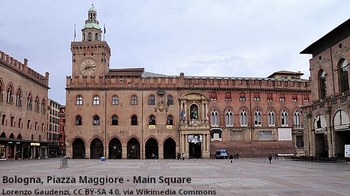Logistic details, social events and contact information

Bologna - A multicultural city
Bologna is the capital and largest city of the Emilia-Romagna region in northern Italy. It is the seventh most populous city in Italy, with about 400,000 inhabitants and 150 different nationalities. Its metropolitan area is home to more than 1,000,000 people. Bologna is most famous for being the home to the oldest university in continuous operation, the University of Bologna, established in AD 1088.
Originally Etruscan, the city has been an important urban center for centuries, first under the Etruscans (who called it Felsina), then under the Celts as Bona, later under the Romans (Bonōnia), then again in the Middle Ages, as a free municipality and later signoria, when it was among the largest European cities by population. Famous for its towers, churches and lengthy porticoes, Bologna has a well-preserved historical centre, thanks to a careful restoration and conservation policy which began at the end of the 1970s. In 2000, it was declared European capital of culture and in 2006, a UNESCO "City of Music" and became part of the Creative Cities Network. In 2021, UNESCO recognized the lengthy porticoes of the city as a World Heritage Site (text from Wikipedia).
Lodging
The full list of Hotels in Bologna can be found here. For convenient accommodations you may also check the standard booking platform. There are lots of B&B in Bologna. Suggestions for high class hotels may be:
5 stars - Gran Hotel Majestic (city center);
4 stars - Royal Hotel Carlton (city center);
4 stars - Starhotels Excelsior (city center, in front of the train station)
Side events
The day before the conference, June 18, at 4pm, Guenter Bloeschl will deliver a distinguished lecture (in Italian) in the Aula Magna of the University of Bologna to celebrate the Stockolm Water Prize. If you are interested to attend, please register here.
A welcome dinner will be organised in the evening of June 18, the day before the conference, with cost shared among the participants. Registered attendants will be contacted individually during the first days of June with more details. A social dinner on June 19 will be eventually organised during the conference.
Poster format
Poster boards have width of 1 meter and height of 2 meters (thus, portrait orientation). No templates are provided. Posters may stay hanged for the whole duration of the meeting.
Book of abstracts
A collection of abstracts in digital format will be produced and published in an open repository, whose coordinates will be made known before the conference.
Delivery of oral and pop-up presentations
Please do send BY JUNE 15 your oral or pop-up presentation (max 2 slides for the pop-up) as an email attachment to alberto.montanari@unibo.it.
Contact point
Please contact Alberto Montanari (alberto.montanari@unibo.it) for further information.